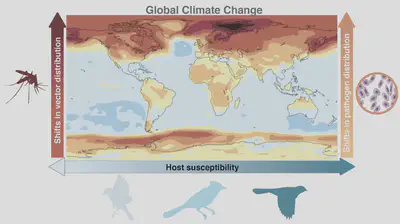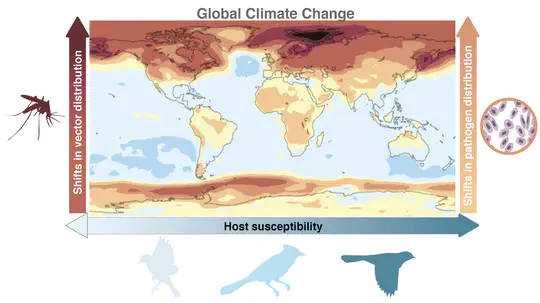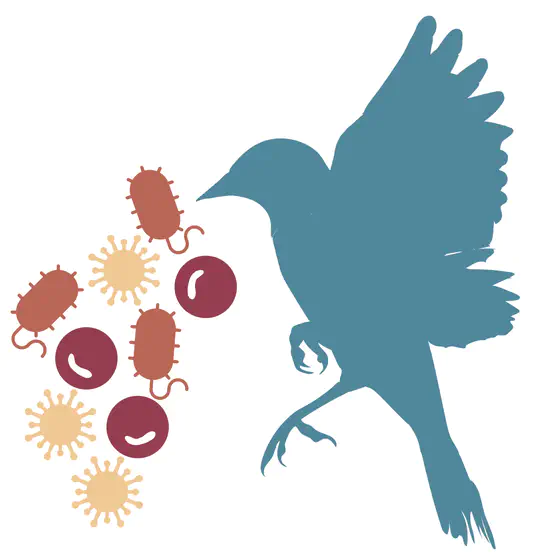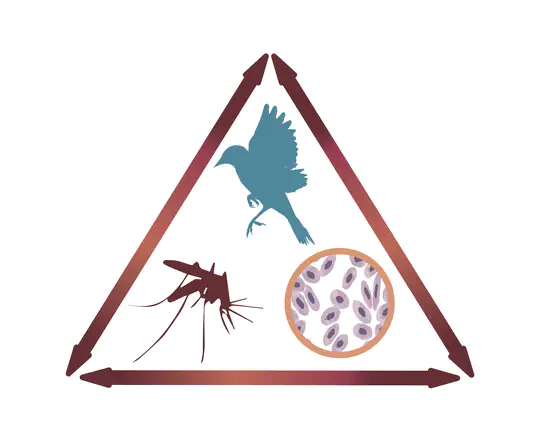Harvey Lab
Avian Disease Ecology
We are the avian disease ecology group at the University of Rhode Island.
We work at the intersection of disease ecology and evolution, conservation,
and transcriptomics to understand the impacts of anthropogenic change, conservation of declining birds,
and how species adapt to these stressors.
Johanna A. Harvey, PhD
Postdoctoral Researcher
Joint position at the University of Maryland & USGS Eastern Ecological Science Center
Research
My research broadly seeks to understand the role of anthropogenic factors, such as global climate change and urbanization, on the ecology and evolution of avian disease and the impacts on wild bird populations. Currently, I am a Postdoctoral Researcher with a joint appointment at the Joint position at the University of Maryland & the USGS Eastern Ecological Science Center working with Drs. Jennifer Mullinax and Diann Prosser. Here my research expands the scope of my avian disease by addressing the current incursion of high pathogenicity avian influenza into North America. This introduction has resulted in an unprecedented and widespread epizootic event heavily impacting poultry and free-living wild birds in the spring and summer of 2022. Recent evolutionary clades of avian influenza have resulted in severe disease in previously asymptomatic wild birds along with an increased geographical spread. My research seeks to identify the changing dynamics of high pathogenicity avian influenza and use decision analysis and modeling to determine effective management options for moving forward and identifying effective and actionable avian disease management options. The collaborative aspects of this emerging disease research allow me to work with wildlife managers, decision scientists, and implement actionable science focused research.
I received my Ph.D. at the Texas A&M University working on avian malaria diversification in the lab of Dr. Gary Voelker. My first postdoctoral position was in Dr. Sarah Knutie’s lab looking at the affects of urbanization and an invasive parasite, Philornis downsi, on Darwin’s finches in the the Galapagos Islands. This was followed by my time as a Gerstner Scholar at the American Museum of Natural History where I began to expolore the role of climate change in range expansions and increasing impacts of avian malaria across latitudes.
I consider myself fortunate to have found science and research. As a young adult I was provided with opportunities to interact with researchers and mentors that exposed a world and opportunities that I didn’t even know existed when I was growing up. I seek to provide these opportunities and an inclusive environment in order open this world up to others and work towards improving diversity in EEB.
I spend my free time with my husband and cat, and I enjoy reading fantasy, hiking, gardening, textile crafts and swimming.
Download my CV.
- Disease ecology
- Anthropogenic stressors
- Immunogenetics
- Decsion Science
-
PhD in Wildlife and Fisheries Sciences, 2018
Texas A&M University
-
BSc in Wildlife and Fisheries Sciences, 2010
Texas A&M University
Experience
Research focus:
- Wildlife Disease Ecology
- Avian influenza research focusing on wild bird population impacts and immune adaption across host species
Research focus:
- Adressing the state of the current highly pathogenic avian influenza virus (Eurasian origin H5N1 of clade 2.3.4.4b) introduction into North America impacting wild birds and poultry.
- Applying decision analysis and modeling of high pathogenicity avian influenza in North America to aid in disease management.
Research overview
My research program uses an integrative framework of disease evolutionary ecology and host immunology to examine the affect of emerging avian pathogens and parasites on hosts. I leverage research to address conservation needs using decision science through collaborative efforts with agency, managers, and stakeholder partners to mitigate drivers of avian decline.

Current Research
My current research examines the novel and high pathogenicity avian influenza virus (HPAIV) H5N1 that emerged in North America beginning in late 2021 through both a trans-Atlantic and Northern Pacific migratory introductions. This has resulted in an unprecedented and widespread epizootic event heavily affecting poultry and free-living wild birds, increasingly mammals, inlcuding dairy cattle and humans. The higher transmission and susceptibility among wild bird hosts are expected to increase the number of wildlife reservoirs for the virus, facilitating the continued spread and virus evolution. This ongoing impact threatens to change disease dynamics and expand this One Health issue. Recent work has examined shifts in geographical expansion, host breadth, and temporal expansion of transmission periods. Ongoing research tries to characterize host repsonses across wild birds and examine species vulnerability but also host roles that inform disease dynamics such as transmission and dispersal.


